非谓语练习题 -语法填空版
- 格式:doc
- 大小:49.50 KB
- 文档页数:7
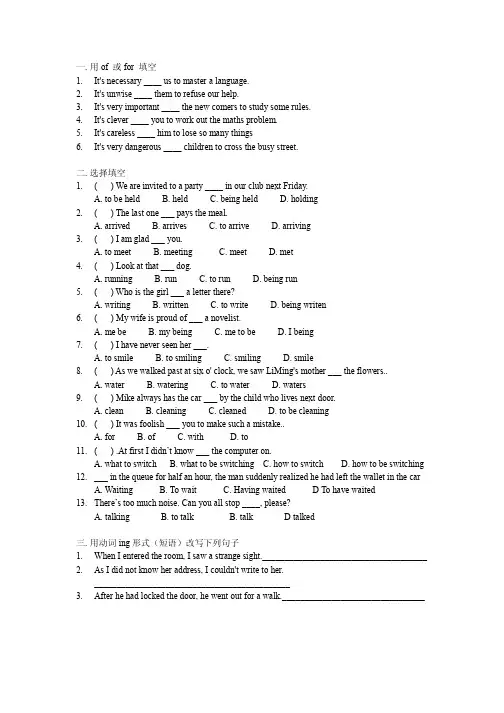
一.用of 或for 填空1.It's necessary ____ us to master a language.2.It's unwise ____ them to refuse our help.3.It's very important ____ the new comers to study some rules.4.It's clever ____ you to work out the maths problem.5.It's careless ____ him to lose so many things6.It's very dangerous ____ children to cross the busy street.二.选择填空1.( ) We are invited to a party ____ in our club next Friday.A. to be heldB. heldC. being heldD. holding2.( ) The last one ___ pays the meal.A. arrivedB. arrivesC. to arriveD. arriving3.( ) I am glad ___ you.A. to meetB. meetingC. meetD. met4.( ) Look at that ___ dog.A. runningB. runC. to runD. being run5.( ) Who is the girl ___ a letter there?A. writingB. writtenC. to writeD. being writen6.( ) My wife is proud of ___ a novelist.A. me beB. my beingC. me to beD. I being7.( ) I have never seen her ___.A. to smileB. to smilingC. smilingD. smile8.( ) As we walked past at six o' clock, we saw LiMing's mother ___ the flowers..A. waterB. wateringC. to waterD. waters9.( ) Mike always has the car ___ by the child who lives next door.A. cleanB. cleaningC. cleanedD. to be cleaning10.( ) It was foolish ___ you to make such a mistake..A. forB. ofC. withD. to11.( ) .At first I didn’t know ___ the computer on.A. what to switchB. what to be switchingC. how to switchD. how to be switching12.___ in the queue for half an hour, the man suddenly realized he had left the wallet in the carA. WaitingB. To waitC. Having waited D To have waited13.There’s too much noise. Can you all stop ____, please?A. talkingB. to talk B. talk D talked三.用动词ing形式(短语)改写下列句子1.When I entered the room, I saw a strange sight._____________________________________2.As I did not know her address, I couldn't write to her.____________________________________________3.After he had locked the door, he went out for a walk.________________________________。
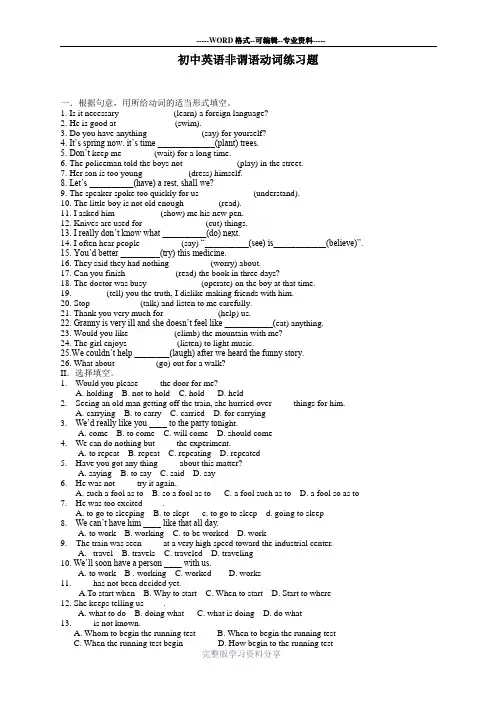
初中英语非谓语动词练习题一.根据句意,用所给动词的适当形式填空。
1. Is it necessary ____________(learn) a foreign language?2. He is good at _____________(swim).3. Do you have anything ____________(say) for yourself?4. It’s spring now. it’s time _____________(plant) trees.5. Don’t keep me _______(wait) for a long time.6. The policeman told the boys not ____________(play) in the street.7. Her son is too young __________(dress) himself.8. Let’s __________(have) a rest, shall we?9. The speaker spoke too quickly for us ____________(understand).10. The little boy is not old enough________(read).11. I asked him __________(show) me his new pen.12. Knives are used for ______________(cut) things.13. I really don’t know what __________(do) next.14. I often hear people _________(say) “__________(see) is____________(believe)”.15. You’d better _________(try) this medicine.16. They said they had nothing _________(worry) about.17. Can you finish ___________(read) the book in three days?18. The doctor was busy ____________(operate) on the boy at that time.19. ______(tell) you the truth, I dislike making friends with him.20. Stop ___________(talk) and listen to me carefully.21. Thank you very much for ____________(help) us.22. Granny is very ill and she doesn’t feel like ___________(eat) anything.23. Would you like __________(climb) the mountain with me?24. The girl enjoys ___________(listen) to light music.25.We couldn’t help ________(laugh) after we heard the funny story.26. What about _________(go) out for a walk?II.选择填空。
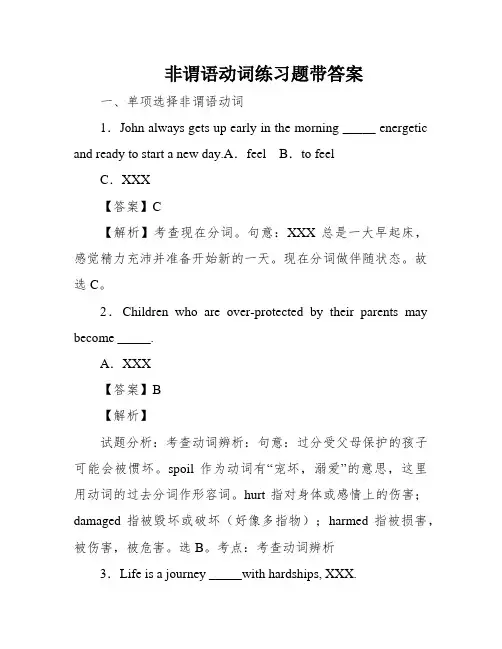
非谓语动词练习题带答案一、单项选择非谓语动词1.John always gets up early in the morning _____ energetic and ready to start a new day.A.feel B.to feelC.XXX【答案】C【解析】考查现在分词。
句意:XXX总是一大早起床,感觉精力充沛并准备开始新的一天。
现在分词做伴随状态。
故选C。
2.Children who are over-protected by their parents may become _____.A.XXX【答案】B【解析】试题分析:考查动词辨析:句意:过分受父母保护的孩子可能会被惯坏。
spoil作为动词有“宠坏,溺爱”的意思,这里用动词的过去分词作形容词。
hurt指对身体或感情上的伤害;damaged指被毁坏或破坏(好像多指物);harmed指被损害,被伤害,被危害。
选B。
考点:考查动词辨析3.Life is a journey _____with hardships, XXX.A.filled【答案】A【剖析】【详解】考查非谓语动词,句意:生命是一个充满艰辛,快乐和特别时刻的旅程。
在题干中_withhardship做journey的后置定语,与所修饰的journey构成被动关系,所以使用过去分词filled。
be filled with做定语的时候,可以把be去掉。
也可以转换成定语从句。
故选A。
XXX filled4.I stopped the car ____ a short break as I was feeling tired.A.take B.taking C.to take D.XXX【答案】C【解析】句意:我停下车来苏息一会儿,因为我觉得累了。
此处动词不定式表目标,故选C。
【考点定位】考查非谓语动词5.Shortly after suffering from a massive earthquake and ________ to ruins, the city took on anew look.A.reducing【答案】C【剖析】B.XXX reduced【详解】考查动名词的被动语态。
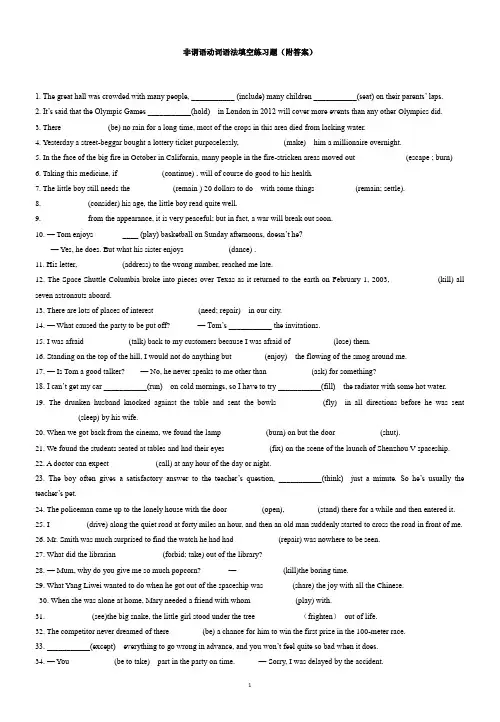
非谓语动词语法填空练习题(附答案)1. The great hall was crowded with many people, ___________ (include) many children ___________(seat) on their parents’ laps.2. It’s said that the Olympic Games ___________(hold) in London in 2012 will cover more events than any other Olympics did.3. There ___________ (be) no rain for a long time, most of the crops in this area died from lacking water.4. Yesterday a street-beggar bought a lottery ticket purposelessly, ___________(make) him a millionaire overnight.5. In the face of the big fire in October in California, many people in the fire-stricken areas moved out ___________(escape ; burn)6. Taking this medicine, if ___________(continue) , will of course do good to his health.7. The little boy still needs the __________ (remain ) 20 dollars to do with some things __________(remain; settle).8. ___________ (consider) his age, the little boy read quite well.9. ___________ from the appearance, it is very peaceful; but in fact, a war will break out soon.10. — Tom enjoys ___________ (play) basketball on Sunday afternoons, doesn’t he?— Yes, he does. But what his sister enjoys ___________(dance) .11. His letter, ___________(address) to the wrong number, reached me late.12. The Space Shuttle Columbia broke into pieces over Texas as it returned to the earth on February 1, 2003, ___________ (kill) all seven astronauts aboard.13. There are lots of places of interest ___________(need; repair) in our city.14. — What caused the party to be put off? —Tom’s ___________ the i nvitations.15. I was afraid ___________(talk) back to my customers because I was afraid of___________(lose) them.16. Standing on the top of the hill, I would not do anything but ________(enjoy) the flowing of the smog around me.17. — Is Tom a good talker? — No, he never speaks to me other than ___________(ask) for something?18. I can’t get my car ___________(run) on cold mornings, so I have to try ___________(fill) the radiator with some hot wat er.19. The drunken husband knocked against the table and sent the bowls ___________(fly) in all directions before he was sent ___________(sleep) by his wife.20. When we got back from the cinema, we found the lamp ___________(burn) on but the door ___________(shut).21. We found the students seated at tables and had their eyes ___________(fix) on the scene of the launch of Shenzhou V spaceship.22. A doctor can expect ___________ (call) at any hour of the day or night.23. The boy often gives a satisfactory answer to the teacher’s question, ___________(think) just a minute. So he’s usually the teacher’s pet.24. The policeman came up to the lonely house with the door ________ (open), ________(stand) there for a while and then entered it.25. I _________(drive) along the quiet road at forty miles an hour, and then an old man suddenly started to cross the road in front of me.26. Mr. Smith was much surprised to find the watch he had had ___________(repair) was nowhere to be seen.27. What did the librarian ___________ (forbid; take) out of the library?28. — Mum, why do you give me so much popcorn? — ___________ (kill)the boring time.29. What Yang Liwei wanted to do when he got out of the spaceship was _______(share) the joy with all the Chinese.30. When she was alone at home, Mary needed a friend with whom ___________(play) with.31. ___________ (see)the big snake, the little girl stood under the tree ___________(frighten)out of life.32. The competitor never dreamed of there ________(be) a chance for him to win the first prize in the 100-meter race.33. ___________(except) everything to go wrong in advance, and you won’t feel quite so bad when it does.34. — You ___________(be to take) part in the party on time. — Sorry, I was delayed by the accident.35.When ___________(compare) with the size of the whole earth, the highest mountain doesn’t seem high at all.36. ___________ (dress)in her best suit, the girl tried to make herself ___________(notice) at the party.37. The matter ___________(relate) to your study surely requires ___________(deal) with carefully.38. Her ___________(not come) back made her parents worried a lot.39. Everything __________(take) into consideration, they believed themselves more and returned to their positions.40. He moved away from his parents and missed them too much to enjoy the ___________(excite) life in New York.41. — What do you think of the plan? —It’s easier said than ___________(carry) out.42. Many businessmen attended the Boao Forum (博鳌论坛)because they knew what ________(get) from the forum.43. There was a famous person at the party whom everyone would like ___________(introduce) to themselves.44. — Were you at home last Sunday? — Yeah! I devoted the whole day to ________ (review) the English grammar.45. Once ___________(catch; steal) at the shop, you will be dismissed immediately.46. Prices of daily goods ___________(buy) through a computer can be lower than store prices.47. The summer vacation ___________(be) over, John returned to school from his hometown.48. ___________(suppose) she can’t come, who will do the work?49. — Is there anything you want from town?— No, thank you. But I would like to get those letters ___________(mail).50. After the guests left, she spent as much time as she could ___________ (tidy) up the rooms.答案及部分解析:一、填空1. including; seated including为介词;由seat的用法可知,此处应用其过去分词形式。
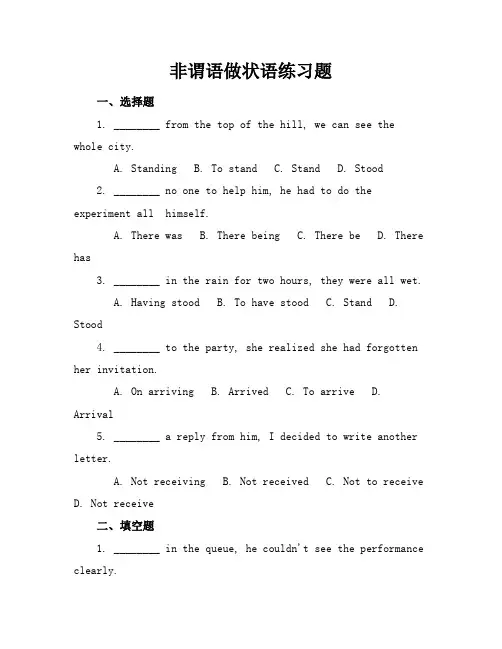
非谓语做状语练习题一、选择题1. ________ from the top of the hill, we can see thewhole city.A. StandingB. To standC. StandD. Stood2. ________ no one to help him, he had to do the experiment all himself.A. There wasB. There beingC. There beD. There has3. ________ in the rain for two hours, they were all wet.A. Having stoodB. To have stoodC. StandD. Stood4. ________ to the party, she realized she had forgotten her invitation.A. On arrivingB. ArrivedC. To arriveD.Arrival5. ________ a reply from him, I decided to write another letter.A. Not receivingB. Not receivedC. Not to receiveD. Not receive二、填空题1. ________ in the queue, he couldn't see the performance clearly.2. ________ with the problem, the students turned to their teacher for help.3. ________ the phone call, she rushed to the hospital immediately.4. ________ a good rest, you will feel much better.5. ________ how to operate the machine, he asked the supervisor for guidance.三、改错题1. Waiting for the bus, a man hit me on the back.________ ________ ________2. Having finished the homework, the book was put on the desk.________ ________ ________3. To learn English well, it is necessary to practice every day.________ ________ ________4. Not having seen the movie, I can't tell you the plot.________ ________ ________5. Returned home, his mother was cooking dinner.________ ________ ________四、翻译题1. 看到这个消息,他立刻赶往现场。
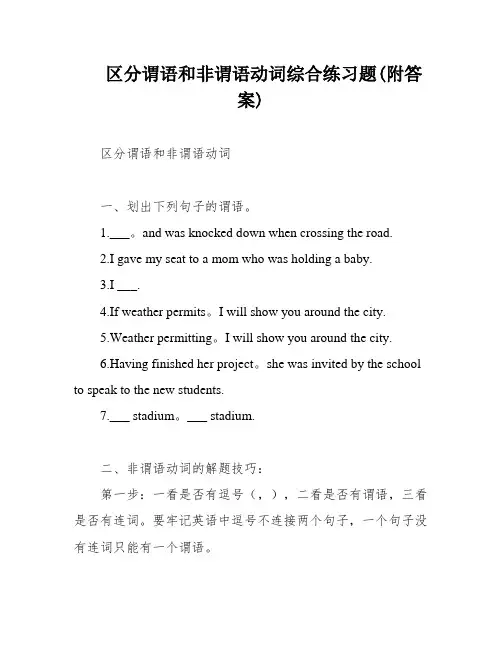
区分谓语和非谓语动词综合练习题(附答案)区分谓语和非谓语动词一、划出下列句子的谓语。
1.___。
and was knocked down when crossing the road.2.I gave my seat to a mom who was holding a baby.3.I ___.4.If weather permits。
I will show you around the city.5.Weather permitting。
I will show you around the city.6.Having finished her project。
she was invited by the school to speak to the new students.7.___ stadium。
___ stadium.二、非谓语动词的解题技巧:第一步:一看是否有逗号(,),二看是否有谓语,三看是否有连词。
要牢记英语中逗号不连接两个句子,一个句子没有连词只能有一个谓语。
①【2012陕西卷】15.Standing in a long queue。
we waited for the store to open to buy a New iPad.②【2012重庆卷】31.Before you quit your job。
consider how your family would feel about your n.2.I heard that my name was called just now。
(无错误)3.I am acquainted with the man who ___.4.___?5.The book。
written in 1975.remains popular to this day.6.They waited for the bus。
___.7.Some students followed him as he ___.8.While walking down the street。
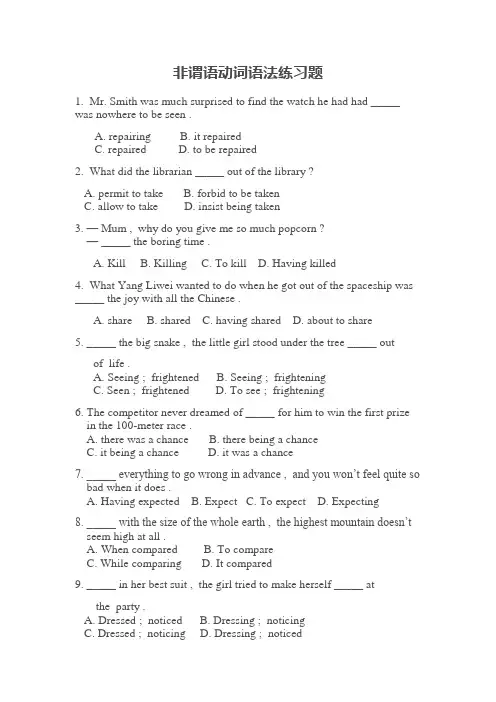
非谓语动词语法练习题1. Mr. Smith was much surprised to find the watch he had had _____ was nowhere to be seen .A. repairingB. it repairedC. repairedD. to be repaired2. What did the librarian _____ out of the library ?A. permit to takeB. forbid to be takenC. allow to takeD. insist being taken3. — Mum , why do you give me so much popcorn ?— _____ the boring time .A. KillB. KillingC. To killD. Having killed4. What Yang Liwei wanted to do when he got out of the spaceship was _____ the joy with all the Chinese .A. shareB. sharedC. having sharedD. about to share5. _____ the big snake , the little girl stood under the tree _____ outof life .A. Seeing ; frightenedB. Seeing ; frighteningC. Seen ; frightenedD. To see ; frightening6. The competitor never dreamed of _____ for him to win the first prize in the 100-meter race .A. there was a chanceB. there being a chanceC. it being a chanceD. it was a chance7. _____ everything to go wrong in advance , and you won’t feel quite so bad when it does .A. Having expectedB. ExpectC. To expectD. Expecting8. _____ with the size of the whole earth , the highest mountain doesn’t seem high at all .A. When comparedB. To compareC. While comparingD. It compared9. _____ in her best suit , the girl tried to make herself _____ atthe party .A. Dressed ; noticedB. Dressing ; noticingC. Dressed ; noticingD. Dressing ; noticed10. _____ made her parents worried a lot .A. Her not to come backB. Not her to come backC. Her not coming backD. Not her coming back11. Everything _____ into consideration , they believed themselves more and returned to their positions .A. to takeB. takenC. to be takenD. taking12. — What do you think of the plan ?—It’s easier said than _____ .A. carried outB. carrying outC. carry outD. to carry out13. Many businessmen attended the Boao Forum (博鳌论坛)because theyknew what _____ from the forum .A. to getB. to be gotC. gotD. getting14. There was a famous person at the party whom everyone would like_____ to themselves .A. to introduceB. to be introducedC. introducingD. being introduced15. — Were you at home last Sunday ?— Yeah ! I devoted the whole day to _____ the English grammar .A. reviewB. reviewingC. be reviewedD. being reviewed16. Once _____ at the shop , you will be dismissed immediately .A. caught stealingB. caught to stealC. catching stealingD. to catch to steal17. _____ , John returned to school from his hometown .A. The summer vacation being overB. The summer vacation is overC. Because the summer vacation overD. After the summer vacation being over18. _____ she can’t come , who will do the work ?A. SupposedB. SupposingC. Having supposedD. Being supposed19. — Is there anything you want from town ?— No , thank you . But I would like to get _____ .A. those letters mailedB. mailed lettersC. to mail those lettersD. those letters mail20. After the guests left , she spent as much time as she could _____ therooms .A. tidy upB. to clear awayC. clear awayD. tidying upⅡ.完形填空Four years ago in church , I saw a child of my age . His 11 was pinned on the bulletin board , his dirty clothes barely covering his small , 12 body . He should not have had a 13 on his face , but there he had , showing off his white teeth . I walked past his picture every day 14 him less and less . His pictures are also sent to us not to show what the child looks like but to 15 us that we are sponsoring him . We need to reflect because we are so 16 in our own misfortunes that we 17 that there are people worse off than us .Our desires are insatiable(无法满足的) and we take for granted every18 that we are blessed with .I looked at the child’s picture today fo r the first time in a 19time . His letter came every few months and I 20 them over never taking the time to 21 back . I was just too busy spending money going to movies with my friends . We can’t just help others 22 and they need our time and hands to help create a better world for everyone.We are presented with 23 opportunities such as work and education . What we don’t realize is that the people without these 24 would pay every last cent to get the opportunities that 25 themselves to us every day . When they are 26 to us , we shouldn’t push them aside .I honestly 27 if everyone had a chance to experience these ,this world would open up a little more and provide more 28 and assistance to those who 29 it most . Anything can help those homeless in our own city but 30 with me .21.A.prize B.picture C.name D.letter22.A.black B.lovely C.main D.weak23.A.change B.pain C.smile D.sign24.A.noticing B.greeting C.seeing D.touching25.rm B.remind C.teach D.warn26.A.absorbed B.interested C.expert D.lost27.A.believe B.fear C.forget D.doubt28.A.opportunity B.possibility C.relation D.person 29.A.short B.long C.limited D.hard30.A.glanced B.thought C.turned D.looked31.A.go B.call C.write D.pay32.A.physically B.financially C.mentally D.casually 33.A.real B.special C.rare D.many34.A.ways B.plans C.choices D.experiences 35.A.present B.describe C.introduce D.prove36.A.close B.similar C.available D.hopeful37.A.hope B.believe C.doubt D.say38.A.attention B.freedom C.energy D.power39.A.care B.enjoy C.dislike D.need40.A.agrees B.starts C.fights D.talksⅢ.语法填空Table tennis is now a fast , high-tech sport and has 41 most players of all sports in the world . 42 is believed that upper-class Victorians in England invented table tennis in the 1880s , using whatever they could find as 43 (equip).A line of books would often be the net , and sometimes a cigarette box cover would be a racket(球拍).In 1926 , at a meeting 44 (hold) in Berlin , the International Table Tennis Federation was formed . The first World Championships were hosted in London in the same year , but the sport had to wait along time before it was given a chance 45 (make) its first appearance at the 1988 Seoul Olympic Games. The sport has greatly progressed since it was first invented . Nowadays , players use 46 (special) developed rackets and a lightweight , hollow(空心的) ball . Thanks to the high-tech rackets , they can now enjoy the magical feeling of 47 (hit) the ball at over 150 kilometres per hour !Over the years , table tennis 48 (develop) into a worldwide sport . There are perhaps 40 million competitive table tennis 49 (player) and countless ordinary people 50 play less seriously .答案解析Ⅰ.非谓语动词1 .C。
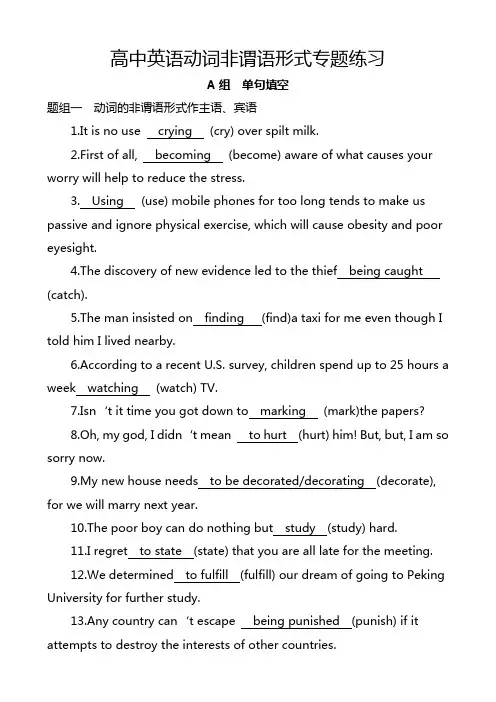
高中英语动词非谓语形式专题练习A组单句填空题组一动词的非谓语形式作主语、宾语1.It is no use crying (cry) over spilt milk.2.First of all, becoming (become) aware of what causes your worry will help to reduce the stress.3. Using (use) mobile phones for too long tends to make us passive and ignore physical exercise, which will cause obesity and poor eyesight.4.The discovery of new evidence led to the thief being caught (catch).5.The man insisted on finding (find)a taxi for me even though I told him I lived nearby.6.According to a recent U.S. survey, children spend up to 25 hours a week watching (watch) TV.7.Isn‘t it time you got down to marking (mark)the papers?8.Oh, my god, I didn‘t mean to hurt (hurt) him! But, but, I am so sorry now.9.My new house needs to be decorated/decorating (decorate), for we will marry next year.10.The poor boy can do nothing but study (study) hard.11.I regret to state (state) that you are all late for the meeting.12.We determined to fulfill (fulfill) our dream of going to Peking University for further study.13.Any country can‘t escape being punished (punish) if it attempts to destroy the interests of other countries.14.When at school, teachers are sure to forbid us to go (go) out to the downtown alone.15.Don‘t mention it any more! As you know, we have already been accustomed to living (live) in the school dormitory.16.Now, it not only devotes itself to selling (sell) books, but combines the functions of the bookstore, the caféand the sale of creative cultural products.17.But if you do find it difficult to fall (fall) asleep at night, then you should avoid naps and try to build up healthy sleepiness in the evening.18.Past studies have shown a link between sleeping less and weighing more, but scientists have had difficulty determining (determine) “Which came first, the chicken or the egg?”says Julie from the University of Michigan in Ann Arbor.19.It is a part of becoming (become) an independent man.20.In my mind, they‘re helping us to become calm and consider winning (win) and solving real problems as well.题组二动词的非谓语形式作表语、补语1.We take care of patients of all ages. There is no type of injury, medical or surgical condition that we are not equipped (equip) to care for.2.They often seem to dislike (dislike) being questioned.3.As well as the weather, the relaxing atmosphere and nightlife are very appealing (appeal).4.His new idea was to make (make) the shell shapes on the roof into the shape of a ball.5.A life burdened with work leads you nowhere, for you will get tired and bored (bore) with your daily routine work.6.Some students will feel a growing sense of fear with the exam season approaching (approach) while others may appear fairly calm.7.He watched a spider making (make) a web.8.In Shanxi, people get their hair cut (cut) in a symbolic move to remove the old and embrace the new.9.That means tobacco manufactures will be forced to pack (pack) their cigarettes in plain packets.10.Apart from the massive size, it also has unmatched accuracy and sensitivity, allowing scientists to find (find) previously hidden stars.11.During the Qin dynasty, to keep the enemy out of his empire, Emperor Qin Shihuang had all walls joined (join) up.12.China‘s image is improving steadily, with more countries recognizing (recognize) its role in international affairs.13.I need a new passport, so I will have to have my photograph taken (take).14.Some students break this rule and some even play with their smartphones in class, which makes teachers discouraged (discourage).15.In short, it is a grateful heart that makes us become (become) kind people and create a harmonious environment.16.It was mainly for this reason that the Brazilian government decided to have a new city built (build) 600 miles north-west of Rio de Janeiro.17.When I got into the office, I found Mr. Green buried (bury) in his work, without noticing my arrival.题组三动词的非谓语形式作定语1.However, our discussions are more than just a way to practice (practice) our debating skills.2.I was watching the clock all through the meeting, as I had a train to catch (catch).3.It‘s amazing (amaze) news that we will go on a research course(研学) next weekend.4.The fellow being treated (treat)by doctors now is exactly my cousin.5.It‘s necessary to drink boiled (boil) water every day, but few people can drink up boiling (boil) water in one minute.6.Actually, it is quite normal for the average person living (live) in a city to see thousands of ads every single day.7.There is a note pinned to the door saying (say) when the supermarket will open again.8.Online, many of them argued that the show‘s delayed (delay) transmission broke their children‘s concept of punctuality, and also criticized the non-commercial TV show for surrendering to commercial advertisements.9.Over 2,000 delegates(代表) chosen (choose) from a group of around 89 million party members across the nation will attend the 20th National Congress of the Communist Party of China.10.Xiong‘an New Area, located (locate) to the southwest of Beijing, covers an area of about 2,000 square kilometers.11.Most colleges now offer first-year students a course specially designed (design) to help them succeed academically and personally.12.I am fond of the plan to go (go) on a trip to Hainan next month.13.The flowers smelling (smell) sweet in the botanic garden attract visitors to the beauty of nature.题组四动词的非谓语形式作状语1.Anxiously, she took the dress out of the package and tried it on, only to find (find)it didn‘t fit.2.Clearly and thoughtfully written (write),the book inspires confidence in students who wish to seek answers of their own.3.Group activities will be organized after class to help (help) children develop team spirit.4. Having spent (spend)the past year as an exchange student in Hong Kong, Linda appears maturer than those of her age.5.The lecture having been given (give), a livelyquestion-and-answer session followed.6.Here are some tips to help you in managing stress around exam time...It‘s a good idea to talk to your classmates and teachers to share (share)fears.7. Hosted (host)by Jinan Municipal People‘s Government, the winter swimming race has been held for seven successive years.8.And it made me think that maybe I need to set time aside to tell (tell)the people in my life how much I appreciate what they did.9.On the other side, many Chinese systems have been created to earn (earn) money.10.An archaeological (考古) survey, using (use) advanced technologies, has concluded that the Ming walls measure 8,850 km.11.Throughout Sandra‘s life, she had to move between cities, never allowing (allow) her much time to get settled in one place.12. Seeing (see) the news of its return to Yiwu, Jin‘s mother encouraged him to write about it and then send the letter to Queen ElizabethⅡ.13.In the show, the hosts and guests should complete tasks at a given place to win (win) the race.14.“Would you like me to wrap it for you?”she asked, smiling (smile) again.15. Compared (compare) with the traditional trade mode, they don‘t have to spend money in renting a house. However, there are still some disadvantages to online shopping.B组单句改错1.Feeling tiring, Li Hua went to bed immediately.tiring→tired2.The contrast in their points of view is so extreme that we grow puzzling sometimes.puzzling→puzzled3.Take a part-time job is a good form of social practice.Take→Taking4.But for the latter, requiring them to speak may be embarrassed because they usually know nothing.embarrassed→embarrassing5.I was worrying and decided to take her to the hospital.worrying→worried6.Instead of seek shelter, my parents suggested we help a couple of stall owners pack their books.seek→seeking7.Mobile phone addicts can‘t help check their mobile phones all day, even when they are walking on the road.check→checking8.In the beginning, I wasn‘t used to talk to strangers.talk→talking9.It was Friday, early in the morning. I did not want go to school, so I told my mother that I got a fever.want后加to10.He hopes create an environment for his students that is much more relaxing than the one he used to study in.hopes后加to11.We gathered at the Sunshine Square and gave out leaflets to passers-by, tell them the importance of environmental protection.tell→telling12.Then we were making dumplings together with the old, talking and laugh.laugh→laughing13.I went to the seaside to spending my summer holiday with my family.spending→spend14.We often regret that we didn‘t seize those opportunities, thus feel upset.feel→feeling15.Watch the flag rising in the brilliant sun, we were quite excited and proud of our motherland.Watch→Watching16.Have classes in such a beautiful environment, we feel very happy.Have→Having17.Seeing from the top, the city is extremely beautiful.Seeing→Seen18.In addition, attracting by interesting topics, you are free to get involved in the weekly discussion.attracting→attracted19.After school, I went back home in time to help my parents do some housework while enjoy some light music.enjoy→enjoying20.Dressing in black, he was playing with a smartphone while eating.Dressing→Dressed21.I want to buy a brush to paint.paint后加with22.One Friday afternoon, I went to a cellphone store and chose a large button phone specially designing for seniors.designing→designed23.After I followed the advice giving by my teacher, I finally overcame the fear.giving→given24.Soldiers came to rescue those burying under the ruins, and the government provided food, clothes, and shelters for the homeless.burying→buried25.Seeing them are working so hard on such a cold morning, I was moved and made up my mind to do something for them.去掉are26.I was walking to school this morning when I caught sight of an old woman with a walking stick lain on the ground.lain→lying27.When I was in Grade 5, I met a teacher who made me remembered her forever.remembered→remember28.The square was very busy, with cars, buses, bicycles and pedestrians gone in all directions.gone→going29.What‘s more, he wanted the thief know he was forgiven.know前加to。
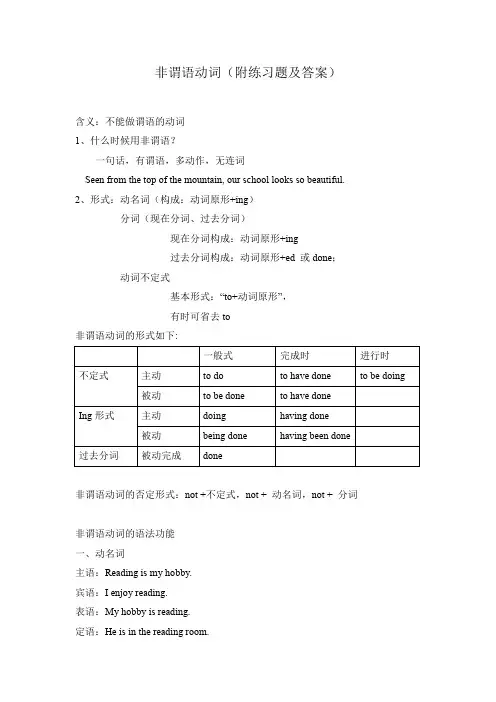
非谓语动词(附练习题及答案)含义:不能做谓语的动词1、什么时候用非谓语?一句话,有谓语,多动作,无连词Seen from the top of the mountain, our school looks so beautiful. 2、形式:动名词(构成:动词原形+ing)分词(现在分词、过去分词)现在分词构成:动词原形+ing过去分词构成:动词原形+ed 或done;动词不定式基本形式:“to+动词原形”,有时可省去to非谓语动词的形式如下:非谓语动词的否定形式:not +不定式,not + 动名词,not + 分词非谓语动词的语法功能一、动名词主语:Reading is my hobby.宾语:I enjoy reading.表语:My hobby is reading.定语:He is in the reading room.二、现在分词表语:The book is interesting.定语:It's an interesting book.状语:He sat there, reading a newspaper.宾补:I saw him standing there.三、过去分词表语:They were excited at the news.定语:There are a few minutes left.状语:Seen from the hill, our school looks beautiful.宾补:I saw him beaten by Tom.四、不定式主语:To catch the train is impossible.宾语:They need to look at a map.表语:My work is to clean the classroom.定语:I have lots of work to do.状语:I am sorry to trouble you.宾补:He told me to close the door.考点动名词考点一:动名词作宾语的动词1.admit doing sth. 承认做某事2.advise/suggest doing sth. 建议做某事3.allow/permit doing sth. 允许做某事4.appreciate doing sth. 感激做某事5.avoid doing sth. 避免做某事6.consider doing sth. 考虑做某事7.delay/put off doing sth. 推迟做某事8.deny doing sth. 否认做某事9.like(enjoy)/dislike doing sth.喜欢/不喜欢做某事10.escape doing sth. 逃脱做某事11.fancy doing sth. 喜欢做某事12.finish doing sth. 完成做某事13.forbid /prohibit doing sth. 禁止做某事14.forgive doing sth. 原谅做某事15.give up doing sth. 放弃做某事16.imagine doing sth. 想象做某事17.keep doing sth. 保持做某事18.mention doing sth. 提及做某事19.mind doing sth. 介意做某事20.miss doing sth. 错过做某事21.practice doing sth. 练习做某事22.prevent doing sth. 阻止做某事23.report doing sth. 报告做某事24.risk doing sth. 冒险做某事25.stop doing sth. 停止做某事词组:devote to,get down to,be accustomed to confess to have trouble/difficulty (in)doing sth.例题:He enjoys ___ pop music while I prefer classical music.A. listen toB. to listenC. listeningD. listening to补充知识:及物动词:后面必须跟宾语的动词,像buy,reach,give等。
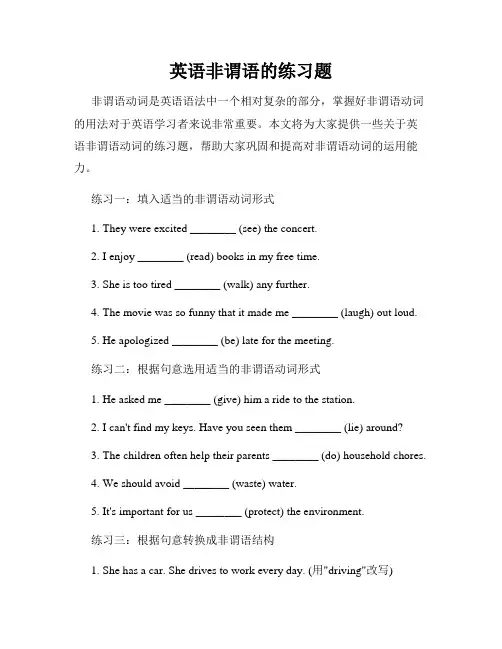
英语非谓语的练习题非谓语动词是英语语法中一个相对复杂的部分,掌握好非谓语动词的用法对于英语学习者来说非常重要。
本文将为大家提供一些关于英语非谓语动词的练习题,帮助大家巩固和提高对非谓语动词的运用能力。
练习一:填入适当的非谓语动词形式1. They were excited ________ (see) the concert.2. I enjoy ________ (read) books in my free time.3. She is too tired ________ (walk) any further.4. The movie was so funny that it made me ________ (laugh) out loud.5. He apologized ________ (be) late for the meeting.练习二:根据句意选用适当的非谓语动词形式1. He asked me ________ (give) him a ride to the station.2. I can't find my keys. Have you seen them ________ (lie) around?3. The children often help their parents ________ (do) household chores.4. We should avoid ________ (waste) water.5. It's important for us ________ (protect) the environment.练习三:根据句意转换成非谓语结构1. She has a car. She drives to work every day. (用"driving"改写)2. He didn't study for the test. He failed. (用"not studying"改写)3. The book is interesting. I recommend it to you. (用"recommended"改写)4. Mary didn't have a map. She got lost. (用"not having"改写)5. Jack is a musician. He plays the guitar very well. (用"playing"改写)练习四:根据汉语提示翻译下列句子1. 他们正在吃晚饭的时候,电话响了。
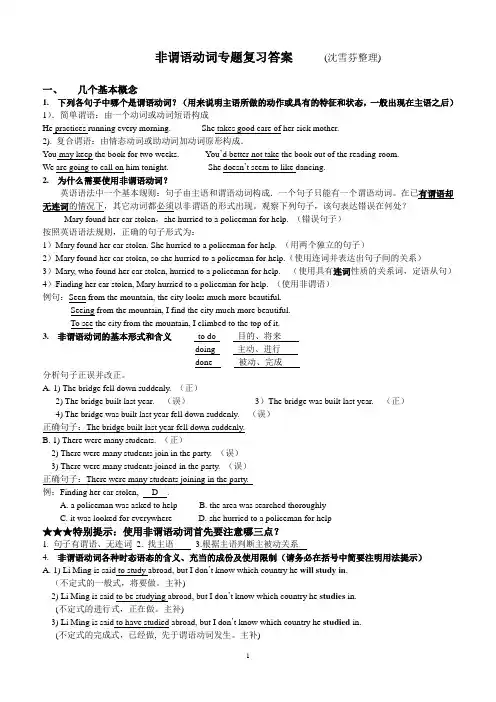
非谓语动词专题复习答案(沈雪芬整理)一、几个基本概念1.下列各句子中哪个是谓语动词?(用来说明主语所做的动作或具有的特征和状态,一般出现在主语之后)1).简单谓语:由一个动词或动词短语构成He practices running every morning. She takes good care of her sick mother.2). 复合谓语:由情态动词或助动词加动词原形构成.You may keep the book for two weeks. You’d better not take the book out of the reading-room.We are going to call on him tonight. She doesn’t seem to like dancing.2.为什么需要使用非谓语动词?英语语法中一个基本规则:句子由主语和谓语动词构成.一个句子只能有一个谓语动词。
在已有谓语却无连词的情况下,其它动词都必须以非谓语的形式出现。
观察下列句子,该句表达错误在何处?Mary found her car stolen,she hurried to a policeman for help. (错误句子)按照英语语法规则,正确的句子形式为:1)Mary found her car stolen. She hurried to a policeman for help. (用两个独立的句子)2)Mary found her car stolen, so she hurried to a policeman for help.(使用连词并表达出句子间的关系)3)Mary, who found her car stolen, hurried to a policeman for help. (使用具有连词性质的关系词,定语从句)4)Finding her car stolen, Mary hurried to a policeman for help. (使用非谓语)例句:Seen from the mountain, the city looks much more beautiful.Seeing from the mountain, I find the city much more beautiful.To see the city from the mountain, I climbed to the top of it.3.非谓语动词的基本形式和含义to do 目的、将来doing 主动、进行done 被动、完成分析句子正误并改正。
高中非谓语动词练习题及答案详解一、单项选择非谓语动词1.Moving to Canada for higher education has been exciting. On the first day of term, there were crowds of people in the dormitory, all where they should go.A.looked for B.looking for C.were looking for D.had been looking for【答案】B【解析】【详解】考查非谓语动词。
句意:到加拿大接受高等教育令人兴奋,开学第一天,宿舍挤满了人,大家都在找自己该去的地方。
People与look for是逻辑上的主谓关系,表示主动,用现在分词作伴随状语,故B项正确。
2.______ to nuclear radiation, even for a short time, may influence genes in human bodies. A.Having exposed B.Being exposedC.To expose D.Exposed【答案】B【解析】【详解】考查动名词。
句意:暴露于核辐射中甚至很短时间都会影响人体的基因。
分析句子成分发现even for a short time是插入语,may influence是谓语,前面的部分应该是主语,be exposed to“暴露于”,要用动名词Being exposed to。
故B选项正确。
3.With Father’s Day around the corner, I have taken some money out of the bank ________ presents for my dadA.buy B.to buy C.buying D.to have bought【答案】B【解析】句意:父亲节将要到来, 为了给爸爸买礼物我已经从银行取了一些钱。
高中非谓语动词练习题及答案详解一、单项选择非谓语动词1.Tony, would you go and see if Sam has any difficulty ____ his tape recorder?A.to fix B.fixingC.for fixing D.fix【答案】B【解析】考查短语: have difficulty (in )doing sth 做什么事情有困难,句意:托尼,你去看看萨姆再修他的录音机方面有困难吗?所以选B。
2.Look over there! There is a long, winding path ________ up to the house.A.lead B.leadingC.led D.to lead【答案】B【解析】【详解】考查非谓语动词。
句意:看那边!有一条长长的蜿蜒小路通向那所房子。
分析句式可知,这是个there be 句型,因此,此处用非谓语动词,path与lead是主动关系,因此用现在分词,故选B。
3.China’s Chang’e 4 robotic probe entered lunar or bit on Wednesday, ________ a major step in its mission to make a soft landing on the moon’s far side.A.marking B.to markC.having marked D.marked【答案】A【解析】【详解】考查非谓语动词。
句意:周三,中国的嫦娥4号机器人探测器进入月球轨道,标志着它在月球远端软着陆任务中迈出了重要一步。
逗号前是主句,逗号后是非限制性定语,修饰整个主句,结合句意,主句和mark之间是主动关系,故用现在分词作定语,A选项正确。
【点睛】不定式和现在分词均可用结果状语,但两者用法有区别:现在分词用作结果状语,通常表示一种自然的结果,即属预料之中的事;不定式用作结果状语,主要表示没有预料到的情况或结果,即属预料之外的事。
非谓语动词练习题带答案一、单项选择非谓语动词1.Time, ________ correctly, is money in the bank.A.to use B.used C.using D.use【答案】B【解析】本题考察非谓语动词。
根据句子结构,所填成分是对主句的补充说明,因此只能是作状语。
再根据非谓作状主语应与主句一致原则,判断出use与主语time之间为被动,因此直接得出答案B。
句意:时间,如果使用得当的话,就是存在银行里的钱。
2.115.______ his love, Chris sent his mom a thank-you note on Mother’s Day. A.Expressing B.Expressed C.To express D.Having expressed【答案】C【解析】考查动词不定式。
句意:为了表达他的爱,克里斯在母亲节那天给他的妈妈寄了一条感谢信。
用不定式表目的,故选C。
3.Someone who lacks staying power and perseverance is unlikely to ______ a good researcher. A.make B.turnC.get D.grow【答案】A【解析】考查动词辨析。
make表示“发展成为(=develop into)”,是及物动词;turn表示“变成,成为”是不及物动词;get“变成,做成”是不及物动词;grow表示“生长,成长”。
根据句意“缺乏智能和毅力的人是不可能成为一个好的研究人员的。
”及句式结构可知,此处应使用及物动词表示“使成为”之意,make a good researcher 意为“成为一个出色的研究者”。
故最佳答案应为A项。
4.______ that she was going off to sleep, I asked if she’d like that little doll on her bed. A.Seeing B.To see C.See D.Seen【答案】A【解析】考查非谓语动词的用法。
非谓语动词一单选1. The sun ____, even the bird went home.A. go downB. went downC. going downD. goes down2. It ____ heavily, the football match had to be canceled.A. being rainedB. being rainingC. rainingD. rains3. ____ from my yard, the stars in the sky looks very attractive.A. SeeB. SawC. SeeingD. Seen4.When I telephoned my teacher , she was waiting ____ the professor who comes from America.A. to seeB. for to seeC. for seeingD. for see5. This little girl who was rescued by the police is very scared,so please speak to her kindly ____ her.A. to not frightenB. so as not to frightenC. in order to not frightenD. for not frightening6. Lily, my house was robbed,because I was so foolish ____ my room unlocked.A. to leaveB. that leaveC. as to leaveD. for me to leave7. The emplyee, ____ at the way the question was asked, didn’t know how to answer it.A. they surprisingB. surprisedC. their being surprisedD. surprise8. How I regret the time ____ in playing the useless computer games!A. which wastedB. having been wastedC. which wastingD. having wasted9. When they come back from their trip, they found the window broken and something _________.A. to stealB. losingC. missedD. stolen10. The manager wanted this project ____ with great passion.A. to have doneB. to be doneC. doingD. to do11.We should do our best to protect our earth.At least we can stop having the water ____ all the time when we wash our face.A. ranB. to be runningC. runningD. being running12. _______ summer holiday, let’s enjoy ourselves.A. It beingB. BeingC. To beD. Been13. _______,the pepole you talk to have the competence and expertise. That’s how they got to the interview.A. Generally speakingB. Generally spokenC. Generally to speakD. Generally to be spoken14. As ________students,we should behave well..A. educatedB. educatingC. to be educatedD. having educated15. ____ what to do, Tom put his hand up and asked for some advice .A. Not knownB. Not knowingC. Not to knowD. Having not known二.根据所给句子的意思用所给词的适当形式填空(每空最多填3词)1. ___________(know)how to cook will help you to enjoy the life.2. Anyone, once________(test) positive for coronavirus, will receive free medical treatment.3. _________(found) in 2008, the museum keeps on inspiring children’s loveof science.4. I got to school earlier yesterday morning , _________( catch) the 6:30 bus.5.The boss was away for a month. When he got back, there was a pile of work________(wait) for him.6. The moon is soft and bright,______(throw) her reflection on the lake.7. LiuXiang,__________(set) the world record at the 2004 Athens Olympic Games , was considered the most talented player in China.8. The computer just won't start. I think something ______ (go) wrong with it.9. Listening to classical music gives me a chance_______ (change) my life.10. ________(find) the maths very difficult, she decided to move to English.11. When he saw the road _______(block) with an accident, Tom decided to call the police immediately.12. Having waited for one night,I finally saw the sun began to rise in the sky,_______(bathe ) the world in beautiful sunlight.13. You cannot accept an idea________(offer) to you , if it is not based on objective truth.14.If you want to improve your English,you must read an English article aloud some times every day until you have it_____(memorize) well .15.________(stay)awake at night when I prepared for exams, I would drink coffee.16. When she was a little girl, her mother used to _______(tell) her stories which were about stars.17. The yard is empty except for a tree_________(stand) in the middle of it.18. You should stop driving the car_______(have) a rest as you don’t feel well.19.__________ (eat) at that restaurant before, I wanted to take you to eat again.20.__________ (know) which university is suit for her, the girl surfs the internet for information every day .21. The hospital_________(complete) next week will receive seriously ill patients of coronavirus.22. With Christmas around the corner, I have saved some money______(buy) presents for my family and friends.23. I have a lot of work_________ (complete) before the sun goes down.24.When I went into the kitchen, I saw that my mother was cooking with the dining table already________(lay).25.The retired teacher donated most of his savings to the orphans , ___ (enable) them to have a chance to receive education.答案一单选1-5 CCDAB6-10 CBBDB11-15 CAAAB二填空1.Knowing2. tested3. Founded4. having caught5. waiting6. throwing7. having set 8. has gone 9. to change10. Finding 11. blocked 12. bathing13. offered 14. memorized 15. To stay16. tell 17. standing 18. to have19. Having eaten 20. Not knowing 21 to be completed 22.to buy 23.to complete id25.enabling。
(英语)英语非谓语动词练习题及答案一、非谓语动词1.We set up this group disabled people like Ben Smith.A. helpB. to helpC. helping 【答案】B【分析】 【剖析】句意:我们成立这个小组是为了帮助像Ben Smith 小组是帮助人的目的,此处不定式to help 表目的,作目的状语,应选【评论】考察动词不定式做目的状语。
这样的残疾人。
成立B。
2. —Jack hasn't taken his piano lessons for a long time.—He is considering _________ his piano course and spending more time on his study.A. to dropB. to throwC. droppingD. throwing 【答案】C【分析】 【剖析】句意:——Jack 好久没有上钢琴课了。
多的时间花在学习上。
consider doing sth 考虑做某事。
——他在考虑放弃钢琴课,把更drop 放弃;抛弃;throw 抛弃。
故选C。
【评论】考察动名词和动词辨析。
3.My parents didn't allow me ______ to the party.A. goB. to goC. goesD. went 【答案】B【分析】 【剖析】:本题考点为非谓语动词(固定用法)。
allow sb. to do sth.,即“同意某人做某事”。
故答案为 B。
4.—What does the sign mean?—It tells us ____________ in public.A. didn't smokeB. don't smokeC. not to smokeD. not smoke【答案】C【分析】 【剖析】句意:——这个标记是什么意思——它告诉我们在民众场所不要抽烟。
非谓语动词练习题简单一、选择题1. _______ in the room, he suddenly remembered he had left the lights on.A. EnteringB. EnteredC. To enterD. Having entered2. The boy was seen _______ the street.A. to crossB. crossedC. crossingD. having crossed3. _______ to the party, she realized she had forgotten her invitation.A. ArrivedB. To arriveC. ArrivingD. Having arrived4. The teacher asked us _______ quietly after class.A. to leaveB. leavingC. leftD. leave5. _______ the meeting, he went straight to his office.A. AttendedB. AttendingC. To attendD. Having attended二、填空题1. _______ (be) a popular singer is her dream.2. The old man is accustomed to _______ (live) alone.3. _______ (see) from the top of the hill, the city looks more beautiful.4. The boy regretted _______ (not go) to the concert.三、改错题1. Seen from the top of the mountain, the scenery is very beautiful.2. The teacher asked the students don't make any noise.3. He is used to work late at night.4. The book written Mr. Wang is very popular among students.5. The boy regretted to not tell the truth.四、翻译题1. 看到这幅画,我不禁想起了我的童年。
非谓语动词专题练习一、用括号中动词的适当形式填空。
1. Helen had to shout ______(make)herself______ (hear) above the sound of the music.2. Reading is an experience quite different from watching TV; there are pictures ________ (form) in your mind instead of before your eyes.3. The man insisted on ________ (find) a taxi for me even though I told him I lived nearby.4. The old man, ________( work) abroad for twenty years, is on the way back to his motherland.5. You were silly not ________( lock) your car.6. Don’t leave the wate r ________( run) while you brush your teeth.7. When flint ________( introduce) to the market, these products enjoyed great success.8. “We can’t go out in this weather,” said Bob, ________( look ) out of the window.9. My advisor encouraged me ________( take) a summer course to improve my writing skills.10. ________( wait ) in the queue for half an hour, Tom suddenly realized that he had left his wallet at home.11. Linda worked for the Minnesota Manufacturing and Mining Company, ________ (know)as 3M.12. Sarah, hurry up. I’m afraid you can’t have time to get ________( change) before the party.13. ________(attract) by the beauty of nature, the girl from London decided to stay another two days off the farm.14. I don’t know whether you happen ________ (hear), but I’m going to study i n the U. S. A. this September.15. The news reporters hurried to the airport, only ________( tell ) the film stars had left.16. Having been ill in bed for nearly a month, he had a hard time ________( pass) the exam.17. ________(compare) with the size of the whole earth, the biggest ocean doesn’t seem big at all.18. ________( not, complete) the program, they have to stay there for another two weeks.19. If you are planning to spend your money having fun this week, better ________( forget) it—you’ve got some big bills coming.20. According to a recent U. S. survey, children spend up to 25 hours a week________( watch) TV.21. The flu is believed ________ (cause)by viruses that like to reproduce in the cells inside the human nose and throat.22. The flowers ________( smell) sweet in the botanic garden attract the visitors to the beauty of nature.23. The disc, digitally ________ (record)in the studio, sounded fantastic at the party that night.24. ________(attack) by terrorists, the tall building collapsed .25. Robert is said ________( study) abroad, but I don’t know what country he studied in.26. The managers discussed the plan that they would like to see ________( carry) out the next year.27. I’ve worked with ch ild before, so I know what ________ (expect)in my new job.28. ______( suffer) such heavy pollution already, it may now be too late to clean up the river.29. Having a trip abroad is certainly good for the old couple, but it remains ________(see) whether they will enjoy it.30. The research is so designed that once ________(begin) nothing can be done to change it.31. It is said that in Australia there is more land than the government knows what ________ (do)with it .32. A cook will be immediately fired if he is found ________( smoke) in the kitchen.33. I’m going to the supermarket this afternoon. Do you have anything ________( buy) ?34. The pilot asked all the passengers on board to remain ________ (seat )as the plane was making a landing.35. Victor apologized for his ________( be, not) able to inform me of the change in the plan.36. Suddenly, a tall man driving a golden carriage ________ (seize)the girl and took her away, ________( disappear) into the woods.二.将过去分词合并下列各组句子。
1.I found this plate on the floor. The plate was broken in pieces.2. I saw a tall, dark and handsome man. His name is Xiao Ming.3. Yesterday I got the answer to my question on the Internet. It was the one I expected.4. I was frightened by the loud noise. I went to see what was happening.5. He was hit by the lack of fresh air. He got a bad headache.6. The museum was built in 1910. The museum is almost 100 years old.三.按要求改写下列句子。
1. I looked at that modern abstract painting, which was colored in yellow and green. (用过去分词改写)2. On the doorstep I found a lot of bottles marked in green ink. (用定语从句改写)3. Left to itself, the baby began to cry.(将划线部分改写成状语从句)4. United, we stand; divided, we fall. (将划线部分改写成状语从句)5. Beaten by the opposite team, the players were not discouraged and practiced even harder. (将划线部分改写成状语从句)附:读写任务一、记叙文的概括:写作方法—串联要素法记叙文的概要, 一般包括记叙文的六个要素(who; when; where; what; how; why), 也就是考生应先通读阅读短文,找出这六个要素,然后用自己的话将这六个要素串成一两句话即可。